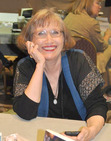Meg Benjamin's Blog, page 17
August 8, 2012
Imaginary People
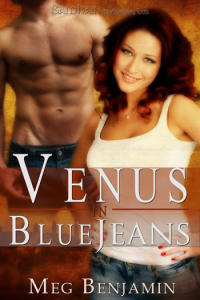 So I’m reading an excerpt from Mavis Gallant’s diary that was written while she was living in Spain working on her first novel. She comments that her characters are more real to her than the people she sees on the street, and that she’s disappointed that she can’t see them and talk to them. Now Gallant was suffering from near-starvation at the time (and exactly why she was starving in Spain instead of working at home in Canada isn’t entirely clear to me), but the way she felt is strangely familiar. There have been days when I felt that way about my characters too.
So I’m reading an excerpt from Mavis Gallant’s diary that was written while she was living in Spain working on her first novel. She comments that her characters are more real to her than the people she sees on the street, and that she’s disappointed that she can’t see them and talk to them. Now Gallant was suffering from near-starvation at the time (and exactly why she was starving in Spain instead of working at home in Canada isn’t entirely clear to me), but the way she felt is strangely familiar. There have been days when I felt that way about my characters too.
One of the great things about writing fiction is that you can create the people you want to spend time with yourself. In fact, that’s one of the things you need to do in order to get into your story. I use a technique that I first learned from the redoubtable Delilah Devlin that requires you to map out your characters before you start writing, talking about their backstories and their favorite pass times. I think it’s similar to what Stanislavski-trained actors do to flesh out the characters they’re playing, only in my case I get to actually create the character too. By the time I’ve finished the first draft of a novel, I know my people pretty well, well enough, in fact, that I find myself wanting to talk about them to other people as if they were real. “Guess what happened to X today?” I start to say. Fortunately, I’m usually able to remind myself that this would constitute lunacy before I get too far into my spiel.
The downside of spending time with these people is the fact that you really don’t want to hurt them. They’re nice. You like them. You don’t want to see them suffer. On the other hand, if they don’t suffer, you’ve got no story, so you usually grit your teeth and bring the pain, perhaps apologizing when you do.
I’ll be frank, though. There have been times that I wish I could have a real conversation with one or two of my characters. I think Docia Toleffson would give good advice. I think Cal Toleffson would provide a sympathetic shoulder. And I think a lot of the people in Konigsburg would be great to have a beer with.
All of which probably means I have at least a whiff of schizophrenia in my psyche since I’d be talking to myself. But if I do, I’m not alone. Like Mavis, I think a lot of us who write fiction create people we’d like to meet. And believe me, there are times when I’d rather spend time in the company of my characters than with a lot of the real people I know.


August 4, 2012
Six Sentence Sunday – Be My Baby
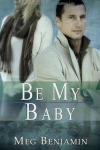 So here’s the rest of the conversation I quoted last time. I’m afraid I left Lars sounding sort of glib, when in reality he’s a sweetie. This book won the EPIC award, by the way.
So here’s the rest of the conversation I quoted last time. I’m afraid I left Lars sounding sort of glib, when in reality he’s a sweetie. This book won the EPIC award, by the way.
“I expect to get laid at least.”
He smiled at her, dark eyes laughing again. Her chest tightened—sometime soon she was going to have to figure out what to do about Lars Toleffson, and the fact that she was in love with him.
Right now, however, she’d rather not.
She blew out a quick breath. “Who knows, Mr. Toleffson, tonight you might get lucky.”


July 31, 2012
RT Vs. RWA
 So I’m just back from the four-day Romance Writers of America (RWA) conference, and I’m still stoked from the experience. Great workshops, interesting publisher spotlights, and free books by the cartload. But a lot of the people there had a very odd reaction when I mentioned the Romantic Times convention (RT to most of us)—they were slightly horrified at the suggestion they might enjoy it. Now lest you think that’s because RWA is made up of staid dowagers, let me say that I got a similar reaction when I mentioned RWA at RT. More than one person assured me they would never set foot in RWA.
So I’m just back from the four-day Romance Writers of America (RWA) conference, and I’m still stoked from the experience. Great workshops, interesting publisher spotlights, and free books by the cartload. But a lot of the people there had a very odd reaction when I mentioned the Romantic Times convention (RT to most of us)—they were slightly horrified at the suggestion they might enjoy it. Now lest you think that’s because RWA is made up of staid dowagers, let me say that I got a similar reaction when I mentioned RWA at RT. More than one person assured me they would never set foot in RWA.
I think that’s a real shame on both counts. I’ve gone to RT a couple of times now and I’ve thoroughly enjoyed myself. I intend to be there in Kansas City in 2013. But I loved my experience at RWA too. I’m already thinking about Atlanta next year. In fact, I’d recommend that romance writers and aspiring romance writings attend both conferences, as long as you’re clear on the differences between them.
RT is largely a fan conference. There are workshops, but they tend to be more oriented toward readers than writers—you get to hear famous writers talking about their books and what they’d like to do in the future. And the parties are both epic and open to everybody. In many ways, in fact, RT is a non-stop party with a lot of romance writers thrown in to spice things up. And there’s nothing wrong with that! I feel like I have to emphasize this because occasionally the non-stop party aspect of RT is held up as a reason to skip it. On the contrary, I’d say it’s a reason to go. You get to meet both readers and writers in a more relaxed social atmosphere, and that can be a lot of fun.
RWA is a professional conference. That means the workshops are largely geared toward professional concerns—self publishing, dealing with agents and editors, new trends in genres, etc. It’s enormously informative, sometimes so much so that you head back to your room just to let your brain relax a little. You do have opportunities to meet famous authors, but it’s usually in a workshop setting where they may be talking about things related to craft or the profession (e.g., Susan Mallery talked extensively about the whole publishing process and how to make it to the New York Times bestseller list). There are parties and receptions at RWA, but they’re frequently limited to writers who are published by a particular line (Harlequin has a famous party, for example, but it’s only for Harlequin authors).
And just to take care of a couple of misconceptions: 1) RT is not a bacchanal. Yes, there are male cover models around (and they’re usually nice guys and good sports), but so far as I know there are no orgies, although maybe I just wasn’t invited to the right parties. 2) RWA is not actively hostile to digital authors. This may have been true a few years ago, but it’s definitely not true now. In fact, more and more of the Old Guard at RWA are heading into self publishing so they’re definitely interested in ebooks, and most traditional publishers are developing ebook lines.
So two conferences with two different vibes. Which should you go to? Again, I’d argue for both. The professional information you get at RWA is invaluable, plus you’ll find many more publishing types there for you to network with. The social experience you get at RT is a treat, and you’ll get to network with other authors in a much less structured setting. As the great Guy Clark said (in a somewhat different context), “Long as you’re handin’ it out, Lord, I’ll take a little of both.”


July 21, 2012
Six Sentence Sunday – Be My Baby
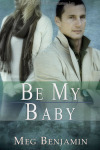 Today’s post is from Be My Baby, which won the EPIC award in 2011. Lars and Jess, my hero and heroine, go through a pretty harrowing experience–Jess’s baby son is almost kidnapped by her villainous in-laws, but Lars and his brothers save the day. In this scene, Lars has just come up with a way to save Jess and her son.
Today’s post is from Be My Baby, which won the EPIC award in 2011. Lars and Jess, my hero and heroine, go through a pretty harrowing experience–Jess’s baby son is almost kidnapped by her villainous in-laws, but Lars and his brothers save the day. In this scene, Lars has just come up with a way to save Jess and her son.
Tears pricked her eyes. “You’re a good man, Lars Toleffson, a very good man.”
“Don’t make me out to be some kind of hero; I expect to be rewarded.” He braced his elbows on the table, leaning toward her.
“With what?”
“I expect to get laid at least.”


July 18, 2012
Dress Like a Romance Writer
 As I’ve said before, I used to be a college teacher, which meant I used to go to lots of conferences since I had to give presentations as part of my job. Believe it or not, there’s a dress code for these conferences—nothing written out, of course, but a code nonetheless. We wore suits, for the most part. Frequently black, but occasionally gray or perhaps dark blue. A few brave souls wore silk scarves or even jewelry (back in the eighties I had some of those big flashy pins), but you didn’t want to go too far. We were Serious People after all.
As I’ve said before, I used to be a college teacher, which meant I used to go to lots of conferences since I had to give presentations as part of my job. Believe it or not, there’s a dress code for these conferences—nothing written out, of course, but a code nonetheless. We wore suits, for the most part. Frequently black, but occasionally gray or perhaps dark blue. A few brave souls wore silk scarves or even jewelry (back in the eighties I had some of those big flashy pins), but you didn’t want to go too far. We were Serious People after all.
But in my heart, I wanted a gypsy shawl.
I really did. Also velvet and satin tops. And dangling earrings with rhinestones. Every time I saw something like this in a shop window, I longed for it, but my practical side kept muttering “You have no place to wear that.” And I didn’t. So I never bought them simply because I knew damn well I’d never have the courage to wear them to any of my conferences, even the Popular Culture Association, which was a little more relaxed than some of the others.
Flash forward a few years to the present. I still go to conferences, but now they’re conferences for romance writers. And I now own a lot of things I’d never have been able to wear to the National Council of Teachers of English, let alone the Modern Language Association.
The Romance Writer Conference Look, you see, is all over the map. Some writers wear pretty much what they wear every day. Some writers wear costumes—literally. One historical writer at RT dressed as Marie Antoinette. J. R. Ward didn’t wear a costume, but she definitely had a Look: black leather pants and jacket, worn with sunglasses (indoors). I’ve begun to think that writers dress according to their mental image of themselves. And I’ve discovered that my mental image is a bit more flamboyant than my workaday self.
But now I’m attending RWA and I’m in a quandary again. I’m not sure RWA is as flamboyant as RT, but I’m not willing to fade back into the woodwork again either. I have a beautiful hand-dyed ruana that I got in Pagosa Springs a couple of months ago. I have a gorgeous silk shawl I got years ago at the San Diego Art Museum. And I have my WabiSabi Wear vest made from vintage kimono fabric. I’ll probably wear all three at some point.
But I’m not sure what other things I’ll be throwing into the mix this year. Maybe a new shawl or scarf. Definitely my spangled “diva jacket” for the big Samhain cocktail party Saturday night. The main thing is, I’ll be there and I’ll be my more flamboyant Romance Writer self. So if you’re around Anaheim from July 25-28, be sure to look me up at the Marriott Anaheim. I’ll be the one in the flashy clothes and the blissful smile.
I’m still looking for that gypsy shawl, though.
RWA Literacy Signing – Wednesday, July 25, 5-8 p.m. Table 300
Samhain Publishing Signing – Friday, July 27, 3-4:30 p.m.


July 14, 2012
Six Sentence Sunday – Wedding Bell Blues
 This is a continuation of last week’s six: Pete and Janie have just seen Janie’s ex having very public sex with another woman. Pete is finally taking Janie to bed himself. Janie wants to make sure it’s not just because he feels sorry for her.
This is a continuation of last week’s six: Pete and Janie have just seen Janie’s ex having very public sex with another woman. Pete is finally taking Janie to bed himself. Janie wants to make sure it’s not just because he feels sorry for her.
Pete took a deep breath, closing his eyes. If only he could get enough blood back to his brain to form a sentence. “I don’t believe in pity sex, Ms. Dupree; among other things, pity doesn’t really do much to get me in the right mood.”
She grinned up at him. “Are you in the right mood?”
Too much talking, entirely too much talking was going on right now. “Lady, I’ve been in the right mood since I saw you walk into the Dew Drop my first night in town.”








July 11, 2012
Plagiarism: I Know It When I See It
 There have been several plagiarism scandals in the online writing community lately—from lifting somebody’s free story and offering it under your own name to (I’m not kidding) lifting Dracula from the Bartleby Project and offering it as a new book under an assumed name. Now all of this pretty straightforward. You steal somebody’s words and you’re plagiarizing, QED. But lately I’ve been wondering about those gray areas in writing that aren’t entirely clear. It’s not so much a question of what plagiarism consists of as it is a question of what originality consists of.
There have been several plagiarism scandals in the online writing community lately—from lifting somebody’s free story and offering it under your own name to (I’m not kidding) lifting Dracula from the Bartleby Project and offering it as a new book under an assumed name. Now all of this pretty straightforward. You steal somebody’s words and you’re plagiarizing, QED. But lately I’ve been wondering about those gray areas in writing that aren’t entirely clear. It’s not so much a question of what plagiarism consists of as it is a question of what originality consists of.
Take plot, for example. Shakespeare’s plots are notoriously borrowed. He used stories from Plutarch, Boccaccio, Plautus and a number of other sources. In fact, Shakespearean texts usually begin by describing just where Shakespeare appropriated this particular story. But no one claims that Shakespeare is a plagiarist. Plots are fair game, although readers may well point out that Book A is pretty similar to Book B, which perhaps did a better job with that particular twist.
So plots are free for the taking. But what about other things? Suppose an author, let’s call him Willy S., has a really cool love scene that takes place on a balcony, and I decide I want to do the same thing. Maybe I even go a step further and have my heroine on said balcony and my hero down below, ready to climb the ivy to be near her, just like Willy S. did. Am I plagiarizing? No, not by most contemporary standards. However, I’m not exactly original either. I’m borrowing and I’ll probably get called for it.
Now for the trickiest thing of all—using research. One of my favorite books of all time, Ursula Le Guin’s The Left Hand Of Darkness, includes an epic journey across a series of glaciers taken by the book’s two heroes (it’s on a planet that’s in a perpetual ice age). The first time I read the book I was convinced that Le Guin herself must be a mountain climber or backpacker because her details were so vivid. But it turned out, according to Le Guin herself, that she based all of these details on firsthand accounts of Arctic and Antarctic adventures. In other words, the facts she presented were real because they were taken from others’ experiences. In this case, I’d argue that Le Guin’s unique perspective creates an original narrative. But for those of us who study others’ work in order to understand what happens when you do something like skiing a downhill course, are we really writing our own stuff or are we simply repeating what we’ve heard?
If we not only repeat what we’ve heard but repeat it in the words of the original source (as happened a couple of years ago with historical author Cassie Edwards) then we’ve clearly crossed the line. But what if the words are changed? If I’m writing a novel about mountain climbing and I choose to base part of it on Jon Krakauer’s Everest account in Into Thin Air, is that plagiarism? I doubt that Krakauer could take me to court, but others could claim that I’m not exactly original.
And yet few of us write only about what we’ve experienced personally. If I stuck to that, my books would have a somewhat limited appeal. I’ve never run a bookstore or managed a winery. It goes without saying that I’ve never been a cop. For all of those things I’ve used my imagination, but I’ve also used the experiences of people who have, in fact, done those things. The best I can do is to acknowledge and thank those people. And hope that nobody thinks I’m stealing.
Originality is a rare commodity. I’m wondering now if it’s possible at all.








July 7, 2012
Six Sentence Sunday – Wedding Bell Blues
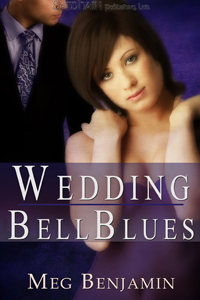 This Sunday it’s Wedding Bell Blues, the story of a wedding disaster. In this scene Pete and Janie, who’ve been circling each other for several days, are finally going to get it on. Of course, they’ve had a little push from Janie’s ex-boyfriend. And this, in turn, makes Janie a little nervous.
This Sunday it’s Wedding Bell Blues, the story of a wedding disaster. In this scene Pete and Janie, who’ve been circling each other for several days, are finally going to get it on. Of course, they’ve had a little push from Janie’s ex-boyfriend. And this, in turn, makes Janie a little nervous.
“Tell me the truth, Pete Toleffson—are you doing this because you feel sorry for me?”
“Sorry?” He was having trouble focusing—what exactly was she talking about, and why had she stopped kissing him?
Her jaw firmed. “Are you sorry for me because Otto dumped me so publicly?”
Good Lord, she was serious!








June 30, 2012
Six Sentence Sunday – Venus In Blue Jeans
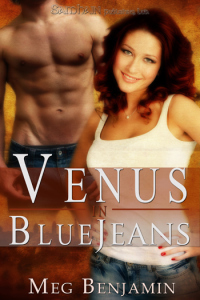 Venus In Blue Jeans, my first Konigsburg book, is pretty lighthearted. Cal and Docia’s love affair is mutual and enthusiastic. But every romance has its bumps and they have a big one. In fact, there’s a point where it’s not clear they’ll make it. Here’s a little bit of that bump. But don’t worry–this is a romance, after all. HEA all the way.
Venus In Blue Jeans, my first Konigsburg book, is pretty lighthearted. Cal and Docia’s love affair is mutual and enthusiastic. But every romance has its bumps and they have a big one. In fact, there’s a point where it’s not clear they’ll make it. Here’s a little bit of that bump. But don’t worry–this is a romance, after all. HEA all the way.
“Y’all better give my baby some space now,” the woman murmured. “She’s had a rough couple of days.”
Docia’s father moved to her other side, wrapping one arm around her waist as her mother patted her on the shoulder. Cal watched as her parents walked her toward the waiting SUV without a backward glance.
He stood frozen for a long moment, aware of a score of curious gazes around the parking lot. “So long, babe,” he murmured and walked toward his truck again.








June 27, 2012
Happy Birthday, Title IX!
 I still remember watching one Summer Olympics many, many years ago with a group of men. It was a date, sort of, after a softball game, and we were sitting at the home of one of the team members having a post-game beer. The players were all science majors and athletes, which should have made them slightly more intelligent than the average guy and slightly more sympathetic to other athletes. But it didn’t—at least in one major area.
I still remember watching one Summer Olympics many, many years ago with a group of men. It was a date, sort of, after a softball game, and we were sitting at the home of one of the team members having a post-game beer. The players were all science majors and athletes, which should have made them slightly more intelligent than the average guy and slightly more sympathetic to other athletes. But it didn’t—at least in one major area.
That area was women in sports. What I mainly remember about that Olympics-viewing session were the derisive comments flying around the room about the women swimmers. They were ugly. They didn’t look like women. They had too many muscles. And, in the case of the US women, they were losers. Ugly losers didn’t count as athletes. They counted as freaks.
Flash forward a good many years to this summer. The US women’s swim team is one of the best in the world. US women athletes like Lindsey Vonn are pictured in pinup shots, showing off their muscles along with their other assets. In other words, women athletes are no longer ugly losers. And they’re definitely not freaks.
So what changed? In a word (two actually), Title IX. Title IX was the Federal regulation that, in 1972, leveled the playing field for men’s and women’s sports. It directed schools to end gender discrimination in their sports programs, among other things. Men’s coaches, of course, have been grousing about this ever since (mutter, mutter, mutter…football; mutter, mutter, mutter…wrestling; mutter, mutter, mutter…revenue streams), but the results are hard to argue with. There’s been a revolution both in the development of outstanding female athletes and in public attitudes toward them. I’m willing to bet that today men who held the kind of attitudes I heard from the softball team would be regarded as prime assholes, which frankly should have been the case back then as well.
I guess I should be clear about the fact that I’m not much of an athlete myself—I have the coordination of Mr. Magoo and I’m not crazy about pain (great athletes have to have a certain masochistic streak). But I envy athletes. I wish I were a runner or a cyclist or a tennis player. And I love to see women excel at sports just as I love to see them excel in other pursuits.
Overall, I think the revolution in women’s athletics in this country has led to a revolution in the way we see women in general, not just athletes. Well-trained, athletic bodies are admired now. Madonna shows off her biceps. Actresses like Anne Hathaway brag about the way they trained for their superhero movies. Serena Williams has her own fashion line. Muscles are no longer the mark of a freak. They’re the mark of a strong, confident woman. And that, my friends, is no small accomplishment.
So Happy Birthday, Title IX. Long may your effects be felt. If not by me than by my hypothetical granddaughters.









